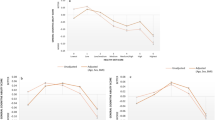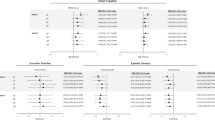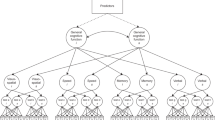Abstract
Background/Objectives:
Cross-sectional and longitudinal studies provide some evidence for an association between intake of antioxidants and B vitamins, and cognitive function in later life, but intervention studies have not provided clear evidence of beneficial effects. The possibility that those with higher cognitive ability during earlier adult life consume more nutrient-rich diets in later life could provide an alternative explanation for the associations seen in observational studies.
Methods:
Survey of 1091 men and women born in 1936 living in Edinburgh, Scotland, in whom previous cognitive ability was available from intelligence quotient (IQ) measurements at age 11 years. At age 70 years, participants carried out a range of cognitive tests and completed a semiquantitative food-frequency questionnaire (FFQ).
Results:
A total of 882 participants returned completed FFQs from which intake of β-carotene, vitamin C, B12, folate and riboflavin was estimated. IQ at age 11 years was positively associated with dietary intake of vitamin C (P=0.048) and inversely associated with dietary intake of riboflavin (P<0.001) at age 70 years, and was higher in those taking folate supplements at age 70 years (P<0.005). Weak associations between intake of vitamins B12, C, riboflavin and folate and cognitive performance at age 70 years were attenuated by adjustment for confounding variables, including IQ at age 11 years. In the fully adjusted models, the proportion of total variance in cognitive function at age 70 years accounted for by intake of these nutrients was less than 1%.
Conclusion:
These results provide no evidence for a clinically significant beneficial association between intake of these antioxidants and B vitamins, and cognitive function at age 70 years.
This is a preview of subscription content, access via your institution
Access options
Subscribe to this journal
Receive 12 print issues and online access
$259.00 per year
only $21.58 per issue
Buy this article
- Purchase on Springer Link
- Instant access to full article PDF
Prices may be subject to local taxes which are calculated during checkout
Similar content being viewed by others
References
Akbaraly TN, Singh-Manoux A, Marmot MG, Brunner EJ (2009). Education attenuates the association between dietary patterns and cognition. Demen Geriatr Cogn Disord 27, 147–154.
Aisen PS, Schneider LS, Sano M, Diaz-Arrastia R, van Dyck CH, Weiner MF et al. (2008). High-dose B vitamin supplementation and cognitive decline in Alzheimer disease: a randomized controlled trial. JAMA 300, 1774–1783.
Balk EM, Raman G, Tatsioni A, Chung M, Lau J, Rosenberg IH (2007). Vitamin B6, B12 and folic acid supplementation and cognitive function: a systematic review of randomized trials. Arch Intern Med 167, 21–30.
Batty GD, Deary IJ, Schoon I, Gale CR (2007). Childhood mental ability in relation to food intake and physical activity in adulthood: the 1970 British Cohort Study. Pediatrics 119, e38–e45.
Cade JE, Burley VJ, Warm DL, Thompson RL, Margetts BM (2004). Food-frequency questionnaires: a review of their design, use and validation. Nutr Res Rev 17, 5–22.
Clarke R (2008). B-vitamins and prevention of dementia. Proc Nutr Soc 67, 75–81.
Deary IJ, Gow AJ, Taylor MD, Corley J, Brett C, Wilson V et al. (2007). The Lothian Birth Cohort 1936: a study to examine the influences on cognitive ageing from age 11 to age 70 and beyond. BMC Geriatr 7, 28.
Deary IJ, Whalley LJ, Starr JM (2009). A Lifetime of Intelligence: Follow-up Studies of the Scottish Mental Surveys of 1932 and 1947. American Psychological Association: Washington, DC.
Deschamps V, Barberger-Gateau P, Peuchant E, Orgogozo JM (2001). Nutritional factors in cerebral aging and dementia: epidemiological arguments for a role of oxidative stress. Neuroepidemiology 20, 7–15.
Durga J, van Boxtel MPJ, Schouten EG, Kok FJ, Jolles J, Katan MB et al. (2007). Effect of 3-year folic acid supplementation on cognitive function in older adults in the FACIT trial: a randomised, double blind, controlled trial. Lancet 369, 208–216.
Eussen SJ, de Groot LC, Joosten LW, Bloo RJ, Clarke R, Ueland PM et al. (2006). Effect of oral vitamin B-12 with or without folic acid on cognitive function in older people with mild vitamin B-12 deficiency: a randomized, placebo-controlled trial. Am J Clin Nutr 84, 361–370.
Feart C, Samieri C, Rondeau V, Amieva H, Portet F, Dartigues J-F et al. (2009). Adherence to a Mediterranean diet, cognitive decline, and risk of dementia. JAMA 302, 638–648.
Grodstein F, Kang JH, Glynn RJ, Cook NR, Gaziano JM (2007). A randomized trial of beta carotene supplementation and cognitive function in men: the Physicians' Health Study II. Arch Intern Med 167, 2167–2168.
Jack Jr CR, Petersen RC, Grundman M, Jin S, Gamst A, Ward CP et al. (2008). Longitudinal MRI findings from the vitamin E and donepezil treatment study for MCI. Neurobiol Aging 29, 1285–1295.
Jia X, McNeill G, Avenell A (2008a). Does taking vitamin, mineral and fatty acid supplements prevent cognitive decline. A systematic review of randomized controlled trials. J Hum Nutr Diet 21, 317–336.
Jia X, Craig LCA, Aucott LS, Milne AC, McNeill G (2008b). Repeatability and validity of a food frequency questionnaire in free-living older people in relation to cognitive function. J Nutr Health Aging 12, 735–741.
Kang JH, Ascherio A, Grodstein F (2005). Fruit and vegetable consumption and cognitive decline in aging women. Ann Neurol 57, 713–720.
Kang JH, Cook N, Manson J, Buring JE, Grodstein F (2006). A randomized trial of vitamin E supplementation and cognitive function in women. Arch Intern Med 166, 2433–2434.
Kang JH, Cook N, Manson J, Buring JE, Albert CM, Grodstein F (2008). A trial of B vitamins and cognitive function among women at high risk of cardiovascular disease. Am J Clin Nutr 88, 1602–1610.
Lawlor DA, Hart CL, Hole DJ, Davey-Smith G (2006). Reverse causality and confounding and the associations of overweight and obesity with mortality. Obesity 14, 2294–2304.
Malouf R, Grimley Evans J (2008). Folic acid with or without vitamin B12 for the prevention and treatment of healthy elderly people and demented people. Cochrane Database Syst Rev 4, CD004514.
Maylor EA, Simpson EEA, Secker DL, Meunier N, Andriollo-Sanchez M, Polito A et al. (2006). Effects of zinc supplementation on cognitive function in healthy middle-aged and older adults: the ZENITH study. Br J Nutr 96, 752–760.
McMahon JA, Green TJ, Skeaff CM, Knight RG, Mann JI, Williams SM (2006). A controlled trial of homocysteine lowering and cognitive performance. N Engl J Med 354, 2764–2772.
McNeill G, Avenell A, Campbell MC, Cook JA, Hannaford PC, Kilonzo MM et al. (2007). Effect of multivitamin and multimineral supplementation on cognitive function in men and women aged 65 years and over: a randomised controlled trial. Nutr J 6, 10.
Morris MC, Evans DA, Tangney CC, Bienias JL, Wilson RS (2006). Associations of vegetable and fruit consumption with age-related cognitive change. Neurology 67, 1370–1376.
Office of Population Census and Surveys (OPCS) (1980). Classification of Occupations 1980. Her Majesty's Stationery Office: London.
Scaremas N, Luchsinger JA, Schupf N Brickman AM, Cosetino S, Tang MX et al. (2009). Physical activity, diet and risk of Alzheimer Disease. JAMA 302, 627–637.
Selhub J (2002). Folate, vitamin B12 and vitamin B6 and one carbon metabolism. J Nutr Health Aging 6, 39–42.
Seshadri S, Beiser A, Selhub J, Jacques PF, Rosenberg IH, D'Agostino RB et al (2002). Plasma homocysteine as a risk factor for dementia and Alzheimer's disease. N Engl J Med 346, 476–483.
Willett WC (1998). Nutritional Epidemiology, 2nd edn. Oxford University Press: New York.
Wolters M, Hickstein M, Flinterman A, Tewes U, Hahn A (2005). Cognitive performance in relation to vitamin status in healthy elderly German women: the effect of 6-month multivitamin supplementation. Prev Med 41, 253–259.
Yaffe K, Clemons TE, McBee WL, Lindblad AS (2004). Age-Related Eye Disease Study Research Group: Impact of antioxidants, zinc and copper on cognition in the elderly: a randomised controlled trial. Neurology 63, 1705–1707.
Acknowledgements
The LBC1936 data were collected by a Research Into Ageing programme grant; this research continues as part of the Age UK-funded (formerly Help the Aged) Disconnected Mind project. We thank the Scottish Council for Research in Education for allowing access to the SMS1947. We thank the LBC1936 participants; for data collection, Michelle Taylor and Caroline Cameron; and LBC1936 Study Secretary, Paula Davies. This research was supported by a PhD studentship from the Institute of Applied Health Sciences, University of Aberdeen, awarded to Xueli Jia.
Author information
Authors and Affiliations
Corresponding author
Ethics declarations
Competing interests
The authors declare no conflict of interest.
Rights and permissions
About this article
Cite this article
McNeill, G., Jia, X., Whalley, L. et al. Antioxidant and B vitamin intake in relation to cognitive function in later life in the Lothian Birth Cohort 1936. Eur J Clin Nutr 65, 619–626 (2011). https://doi.org/10.1038/ejcn.2011.2
Received:
Revised:
Accepted:
Published:
Issue Date:
DOI: https://doi.org/10.1038/ejcn.2011.2
Keywords
This article is cited by
-
Association of vitamin B2 intake with cognitive performance in older adults: a cross-sectional study
Journal of Translational Medicine (2023)
-
Synergistic Application of Zinc and Vitamin C to Support Memory and Attention and to Decrease the Risk of Developing Nervous System Diseases
Neuroscience and Behavioral Physiology (2019)
-
Correlat ion of thiamine metabolite levels with cognitive function in the non-demented elderly
Neuroscience Bulletin (2015)
-
Exploratory analysis of dietary intake and brain iron accumulation detected using magnetic resonance imaging in older individuals: The Lothian Birth Cohort 1936
The Journal of nutrition, health and aging (2015)
-
Epidemiologic studies of modifiable factors associated with cognition and dementia: systematic review and meta-analysis
BMC Public Health (2014)



